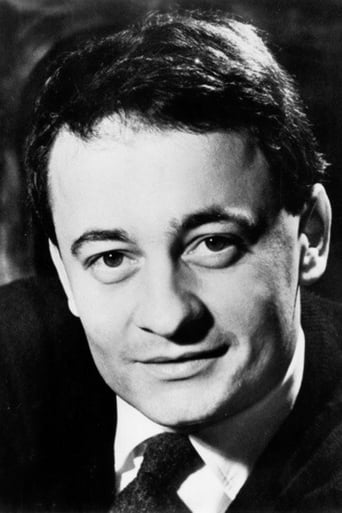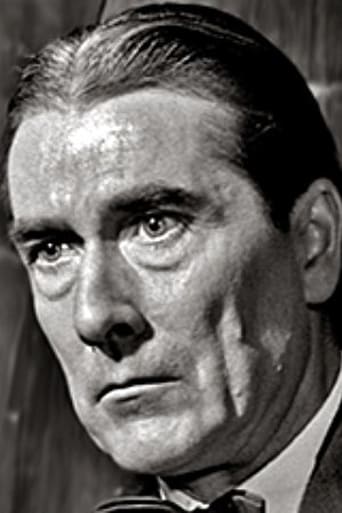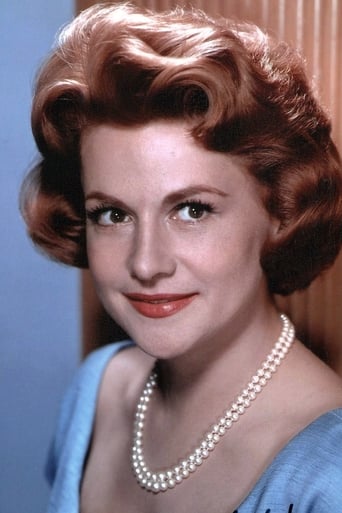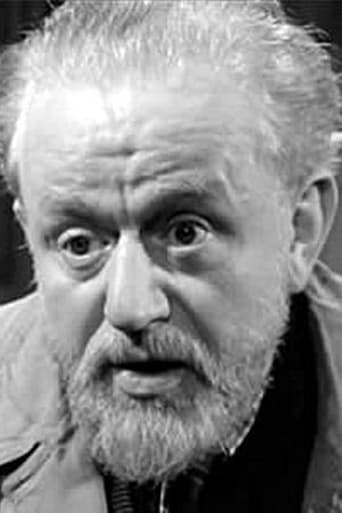Rijndri
Load of rubbish!!
Aubrey Hackett
While it is a pity that the story wasn't told with more visual finesse, this is trivial compared to our real-world problems. It takes a good movie to put that into perspective.
Anoushka Slater
While it doesn't offer any answers, it both thrills and makes you think.
Deanna
There are moments in this movie where the great movie it could've been peek out... They're fleeting, here, but they're worth savoring, and they happen often enough to make it worth your while.
evening1
Intriguing portrait of the solitude of the honest observer.The unnamed Vicar here has an amazing ability to focus on his interlocutor. Even on his deathbed he is deeply, genuinely interested and concerned.His ear is highly threatening to parishioners who are unaccustomed to being seen or heard."No priest shall mix in my family affairs," sniffs the philandering Comte, whose neglected daughter, Chantal (Nicole Ladmiral), is seriously depressed. "I disapprove of your impudence," he tells the cleric. "Your habits are a danger to the parish." The mirror the Vicar extends is discomfiting to almost everyone."People don't hate your simplicity," opines the vicar of a neighboring parish. "They offend themselves against it. It burns them." A tireless giver to others, the country priest seriously neglects his own needs."The illusion of health is not health," his vicar friend wisely notes.Soon, the priest's physical condition and overall sense of well-being take a marked nosedive. "I would have done anything for a word of compassion and kindness," he admits one lonely night, eagerly approaching the window. "The certitude of having been called, yet I know I wouldn't find anyone..." One of the few glimmers of joy arrives on the back seat of a motorcycle driven wildly by Chantal's virile cousin. Having just learned that he is dying, the Vicar savors a refreshing breeze as they speed toward town.The central conflict in this film concerns the Vicar and Chantal. In many ways they are similar but she is far more rough-edged and to-the-point. "This imbecile is a coward," she says of her just-having-died mother. "Never could see to her own happiness." (Is this true of the Vicar as well?)It's the Vicar who notices and remarks on Chantal's flightiness: "You are always restless -- hoping to hide the truth of your soul." The viewer is as frustrated and saddened as the Vicar when the free-thinking Dr. Belpetre commits suicide. As in real life, an inspiring person proves not to be the rock that one has imagined him to be. "Oh miracle -- one can give what one doesn't possess!"I was saddened to read on Wikipedia that Ms. Ladmiral herself committed suicide at age 28, some six years after this film was made, by throwing herself under a subway train.
priddy
A great filmmaker, at the height of his art, working with very strong material. To distill Bernanos' great book down to so few essentials and still convey its full force took a great mind and a great spirit. bleakness has never been more uplifting.There is no need to be religious to partake by this masterpiece, it spirituality will move all equally. Be aware however of one thing: just as many films are not for children, some are not for all adults. Do not watch this (nor read the book) if you are not prepared to have your soul harrowed to its very bottom. you cannot and will not be the same person after watching it.
Turfseer
Throughout the years, the 'passion story' of Jesus has always remained the bedrock of the Catholic church. Although respected, the story of the suffering of a man who lived 2,000 years ago no longer has the same impact it once did in earlier times. In our own time, the average 'believer' looks to the narratives of film for spiritual enlightenment. That's why the Catholic church of today has placed great importance on creating a list of great movies that reflect their values. 'Diary of a Country List' however is not on the Vatican Top 45. That's because director Robert Bresson's modern day Jesus figure, the Priest of Ambricourt, becomes a martyr after being rejected by the Church establishment.Diary of a Country Priest is based on a novel written by George Bernanos in the early 30s. The film was made in 1950 but the pre-World War II setting is retained from the novel. The Priest (who is never named in the film) is an intense young man played by Claude Laydu (in his first film role). The Priest doesn't fit in at all in the village of Ambricourt. He actually suffers from what appears to be colitis (later diagnosed as stomach cancer) and subsists mainly on bread and wine. The rumor starts going around in the Village that he's an alcoholic. The village children don't understand his sophisticated catechisms except for one—Seraphita--who initially impresses the Priest with her knowledge of church doctrine. But when he asks her why she takes her studies so seriously, Seraphita mocks him by answering that he has beautiful eyes. Her schoolmates have all been listening to their conversation at the door to the rectory and burst out laughing at her retort.The Priest obviously isn't very happy by the town's indifferent bordering on hostile reaction to his ministry but he trudges on. His mentor, the Priest of Torcy, is a much more outgoing and practical man who advises him to take control by establishing some kind of 'order' in dealing with his parishioners. Unfortunately, that's just not the Young Priest's style. He's much more blunt and often says exactly what's on his mind. The Priest's faith is tested early on when a physician he consulted for his stomach troubles ends up committing suicide.The core of the narrative involves the Priest's relationship with a local Count and Countess who live on a nearby estate. The Priest hopes to convince the Count to donate money and some unused land for a youth center; the Count at first is receptive and promises to consider the Priest's proposal. Unfortunately, the Priest cannot ignore the fact that the Count is having an affair with the governess at the estate. To make matters worse, the Count's daughter, Chantal, is extremely angry with her father over his affair with the governess and threatens to run away (or even worse, commit suicide). The Priest dissuades the young girl from taking any rash action but refuses to be tactful with the Count, pointing out to him that his daughter is extremely troubled. The Count pegs the Priest as a meddler and makes it clear that his comments aren't welcome.Even worse is the Priest's counseling sessions with the Countess who has been grieving for years over the death of her young son. At first the Countess makes it clear that she's lost all faith in God but the determined Priest manages to get her to look on the bright side once again. Ironically, the Countess drops dead hours after his last counseling session with her and the Count and the rest of the townspeople blame the Priest for 'exciting' the Countess and perhaps hastening (or even causing) her death. As a result, the priest is now 'persona non grata' in the town. He meets with the Priest of Torcy who patronizes him by insisting that his 'alcoholism' stems from (an early version of) fetal alcohol syndrome. He also advises the Priest not to meet with Chantal as he describes her as a 'demon' but the Priest insists he must minister to all—even those who are obviously lost. In some respects, Bresson's updated passion tale echoes the original source material (i.e. The New Testament). Jesus's suffering is blamed on the Jews in the New Testament but here the Priest is cast off by cold and unfeeling townspeople supported by the punitive clergy. This appears to be the primary weakness of Bresson's story. Except for the mature Seraphita who comforts the Priest after he collapses due to abdominal pains and Chantal's cousin, the suave Olivier, who offers up a relaxing motorcycle ride as the Priest journeys to a neighboring town to obtain a consult with a physician, the bulk of the characters are all quite mean-spirited. It's the old stab-in-the-back mentality and Bresson is not immune to employing this device when serving up his newly minted Jesus figure.There's more martyrdom in store for our hapless Priest. Sure enough, not only is he cast out by his parishioners but must endure the final crushing diagnosis: stomach cancer. The ordeal of fire is a modern one—instead of crucifixion on a cross, the Priest endures the modern 'crucifixion' of dying an agonizing death from cancer. The final image is one of the cross and like Jesus, the Priest maintains his faith despite all the suffering.Bresson curiously has been described as an 'agnostic' but I think that's a misnomer. Rather, he accepts the Christian faith but views himself as outside the establishment. Diary of a Country Priest is worth watching a number of times, especially in terms of the gripping cinematography (reminiscent of films from the silent era) as well as the superb use of off-screen audio. Film scholar Peter Cowie's commentary is valuable as he compares the film to the novel. I disagree with his evaluation however, that the film is a masterpiece. The Diary has its thoughtful moments but in the end it's more propaganda than art.
jghbrown
One reviewer has mentioned the importance of the fact that the priest exists mainly on bread and wine. This seems to me to point to the fundamental theme in the movie. Because the movie doesn't simply portray the isolation of the priest from the community but also their isolation from him. In feeling isolated from him they resent him and treat him with some unkindness.What is the priest's disease? Surely, it is not so much cancer as his own purity. He is too much a priest and too little a human being. He sees his suffering as being godliness. As though it is some necessary part of being a priest. He chooses to suffer for the sake of his religion, whereas Christ endured his suffering because he had no choice.The priest hardly ever smiles. He looks out upon sinful humanity from the purity of his little room at the top and there is a great gulf between himself and them. He cannot relate to them nor they to him. In practicing his religion with youthful earnestness he overlooks one important fact. Jesus was above all a human being. He surrounded himself with humans, ate and drank with them, laughed and wept with them. He certainly knew that they sinned, but he also understood the reasons for it, and saw his role as that of the shepherd who cajoles his flock along the correct path, rather than that of someone who draws lines in the sand and says "This you must not cross". Above all, Jesus had compassion, a quality not so much lacking as suppressed by the young priest. In doing so he is unable to offer the daughter of the manor the love (NOT romantic love) which she yearns for.






